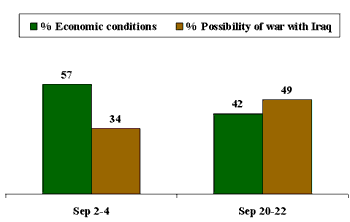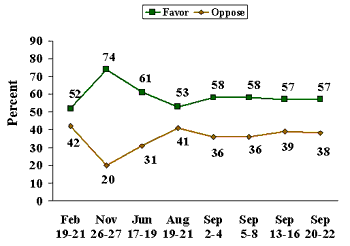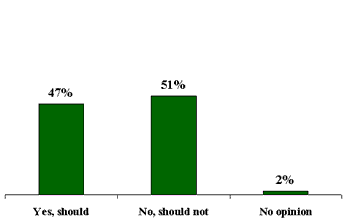GALLUP NEWS SERVICE
PRINCETON, NJ – The American public continues to support the general idea of U.S. military involvement in Iraq, but it is clear that Americans want both United Nations and U.S. Congressional approval before such action is taken. Additionally, the latest CNN/USA Today/Gallup Poll, conducted Sept. 20-22, finds that only about half of the public approves of Congress passing a resolution that would give the president unlimited authority to respond militarily to Iraq whenever he feels it is necessary.
In a significant change from earlier in September, Americans now say that the situation in Iraq will be more important to them in determining their vote in the upcoming mid-term Congressional elections than the economy.
| Importance of Economy and Iraq War to Vote for Congress |
 |
The public remains deeply skeptical that United Nations inspections will deter Saddam Hussein even if they resume. The data show that Americans still consider Osama bin Laden and the Al Qaeda terrorist network to be more of a threat to the United States than Saddam Hussein and Iraq.
Basic Support for U.S. Military Action Against Iraq Continues
The new poll finds no change over the past week in Americans' basic reaction to the possibility of sending American ground troops to the Persian Gulf to remove Saddam Hussein from power in Iraq. In fact, the public's stance has not moved on this question for the last three weeks despite the enormous amount of national discussion of the issue. The current findings: 57% favor sending U.S. ground troops to Iraq in order to remove Saddam Hussein from power; 38% are opposed.
| Public Support for Invading Iraq 2001-2002 |
 |
The new survey also demonstrates that the United Nations has the potential to strongly influence how Americans respond to this issue. Previous polling has shown that about two-thirds of Americans want the U.S. to wait until the United Nations votes on the issue before taking military action. Public support for invading Iraq could rise to as much as 79% if the United States secures the support of the United Nations. By the same token -- and in sharp contrast to President Bush's urgent call for ousting Saddam Hussein from power -- a majority of Americans say they would oppose using U.S. ground troops to invade Iraq if the United Nations were opposed to the action, or if the United States had to take this action alone.
|
Range of Support for U.S. Military Action Against Iraq |
||
|
|
|
|
|
% |
% |
|
|
In general |
57 |
38 |
|
If other countries participate in invading Iraq |
79 |
18 |
|
If the United Nations supports invading Iraq |
79 |
19 |
|
If Congress supports invading Iraq |
69 |
28 |
|
If the United States has to invade Iraq alone |
38 |
59 |
|
If the United Nations opposes invading Iraq |
37 |
58 |
|
If Congress opposes invading Iraq |
37 |
59 |
In similar fashion, the data show that most Americans believe the U.S. Congress should give its approval before the administration takes military action. Almost seven out of ten Americans support the idea of military action if Congress approves, but only 37% support it if Congress opposes such action
Perhaps the most pressing current policy question regarding Iraq is whether the U.S. Congress should grant President Bush the broad latitude he is looking for to wage war on Iraq. Some lawmakers have indicated that the language of any Congressional resolution granting Bush authority to invade Iraq should be more specific about the rationale for and scope of the incursion. Americans are closely split on this question with 47% saying Congress should give Bush "unlimited authority to use military action against Iraq whenever he feels it is necessary" and 51% saying Congress should not grant this.
| Should Congress Grant Bush Unlimited Military Authority on Iraq? |
 |
| Sep 20-22, 2002 |
It is not surprising to find that there are deep political divisions on this question. Three in four Republicans say that such authority should be granted to the president, while only 30% of Democrats agree.
Possible to Fight Two Wars?
One of the arguments made by Bush's critics on Iraq policy is that the mission would spread the United States military too thin, and weaken the country's ability to fight the war on terrorism. Two findings in the current poll speak to this argument, and show that the public comes down on Bush's side of this debate.
- By a 55% to 42% margin, a majority of Americans say they would consider war with Iraq to be part of the war on terrorism that began on Sept. 11, rather than an entirely separate military action. Thus, it seems Americans would view the invasion as progress in the war on terrorism rather than a distraction from it.
- Only 29% of Americans believe that a U.S. invasion of Iraq would render the U.S. ineffective in the war on terrorism in other countries. Nearly as many, 23%, believe it would have no impact on the U.S. ability to pursue the war on terrorism, while 42% believe the military's ability elsewhere would be reduced, but remain effective overall.
Public Dubious About U.N. Inspections
Another counter-argument to Bush's call for war is that the United States should give Iraq more time to comply with United Nations arms inspectors. However, again, Americans seem to share Bush's skepticism that these inspections will produce credible results. Only 20% of Americans believe that Saddam Hussein will agree to inspections that meet the U.N.'s requirements; the remaining 77% predict he will not. And barely a quarter (27%) believe that even if the U.N. does conduct inspections, that these will be effective in eliminating the threat of Iraq using weapons of mass destruction against the U.S.
Bush Job Approval at 66%
Most Americans, 64%, approve of the way President Bush is handling the situation with Iraq. Only 34% disapprove. In addition, the president's overall job approval rating is 66%, down from the 70% rating of a week ago, but generally in line with where it has been in recent weeks and still significantly above the average for presidents over the past 60 years.
Approval for the president's handling of the situation does not necessarily mean that the American public is convinced that the administration has a firm grasp on the Iraq situation at this juncture. Only 46% of Americans believe that the administration "has a clear and well thought out policy on Iraq" while 48% disagree. However, this evaluation is on par with the public's past evaluations of other foreign policy issues, such as George W. Bush's Middle East policy and Bill Clinton's policy with respect to Bosnia and Kosovo. In fact, in the early stages of President Clinton's involvement with Bosnia, from 1995-1997, only a quarter of Americans believed his administration had a cogent foreign policy plan with respect to that struggle. Thus, by comparison, Bush's current "clear and well thought out" rating of 46% is relatively positive.
Osama bin Laden Remains More of a Threat than Saddam Hussein
There is one final point. Despite the fact that over half of Americans say that going after Saddam Hussein is an extension of the war on terrorism, it is clear that the public's number one target remains Osama bin Laden. Given a choice, 50% say Al Qaeda and Osama bin Laden is the bigger threat to the U.S., while just 28% say that Saddam Hussein and Iraq constitute the bigger threat. About one out of five Americans say that they are both equally a threat.
Survey Methods
These results are based on telephone interviews with a randomly selected national sample of 1,004 adults, 18 years and older, conducted July 9-11, 2002. For results based on this sample, one can say with 95 percent confidence that the maximum error attributable to sampling and other random effects is plus or minus 3 percentage points. In addition to sampling error, question wording and practical difficulties in conducting surveys can introduce error or bias into the findings of public opinion polls.
Thinking ahead to the elections for Congress this November, if you had to choose, which of the following issues will be more important to your vote -- [ROTATED: economic conditions, (or) the possibility of war with Iraq]?
|
|
Possibility of war with Iraq |
|
|
|
|
|
|
2002 Sep 20-22 |
42 |
49 |
7 |
1 |
* |
1 |
|
2002 Sep 2-4 |
57 |
34 |
7 |
* |
0 |
2 |
|
2002 Aug 19-21 |
55 |
36 |
7 |
* |
* |
2 |
Would you favor or oppose sending American ground troops to the Persian Gulf in an attempt to remove Saddam Hussein from power in Iraq?
BASED ON --492-- NATIONAL ADULTS IN FORM A
|
Favor |
Oppose |
No opinion |
||
|
2002 Sep 20-22 ^ |
57 |
38 |
5 |
|
|
2002 Sep 13-16 |
57 |
39 |
4 |
|
|
2002 Sep 5-8 ^ |
58 |
36 |
6 |
|
|
2002 Sep 2-4 |
58 |
36 |
6 |
|
|
2002 Aug 19-21 |
53 |
41 |
6 |
|
|
2002 Jun 17-19 ^ |
61 |
31 |
8 |
|
|
2001 Nov 26-27 † |
74 |
20 |
6 |
|
|
2001 Feb 19-21 † |
52 |
42 |
6 |
|
|
1993 Jun 29-30 † |
70 |
27 |
3 |
|
|
1992 Mar 30-Apr 5 †‡ |
55 |
40 |
5 |
|
|
^ |
Asked of half sample. |
|||
|
† |
WORDING: Would you favor or oppose sending American troops back to the Persian Gulf in order to remove Saddam Hussein from power in Iraq? |
|||
|
‡ |
Life Magazine/Gallup. |
|||
Would you favor or oppose invading Iraq with U.S. ground troops in an attempt to remove Saddam Hussein from power?
BASED ON --518-- NATIONAL ADULTS IN FORM B
|
Favor |
Oppose |
No opinion |
|
|
2002 Sep 20-22 |
57 |
38 |
5 |
Do you think the Bush administration has a clear and well-thought out policy on Iraq, or not?
BASED ON --492-- NATIONAL ADULTS IN FORM A
|
Yes, has |
No, does not |
No opinion |
|
|
2002 Sep 20-22 |
46 |
48 |
6 |
Do you approve or disapprove of the way George W. Bush is handling the situation with Iraq?
BASED ON --518-- NATIONAL ADULTS IN FORM B
|
Approve |
Disapprove |
No opinion |
|
|
2002 Sep 20-22 |
64 |
34 |
2 |
Do you think Congress should -- or should not -- vote to give President Bush unlimited authority to use military action against Iraq whenever he feels it is necessary?
|
Yes, should |
No, should not |
No opinion |
|
|
2002 Sep 20-22 |
47 |
51 |
2 |
Some people say they would support invading Iraq with U.S. ground troops only if certain conditions were true. For each of the following conditions, please say if you would favor or oppose invading Iraq with U.S. ground troops if it were true. How about if -- [ITEMS A-B ROTATED, ITEMS C-D ROTATED, ITEMS E-F ROTATED]?
A. The United Nations supported invading Iraq
|
Favor |
Oppose |
No opinion |
|
|
2002 Sep 20-22 |
79 |
19 |
2 |
B. The United Nations opposed invading Iraq
|
Favor |
Oppose |
No opinion |
|
|
2002 Sep 20-22 |
37 |
58 |
5 |
C. Congress supported invading Iraq
|
Favor |
Oppose |
No opinion |
|
|
2002 Sep 20-22 |
69 |
28 |
3 |
D. Congress opposed invading Iraq
|
Favor |
Oppose |
No opinion |
|
|
2002 Sep 20-22 |
37 |
59 |
4 |
E. Other countries participated in invading Iraq
|
Favor |
Oppose |
No opinion |
|
|
2002 Sep 20-22 |
79 |
18 |
3 |
F. The United States had to invade Iraq alone
|
Favor |
Oppose |
No opinion |
|
|
2002 Sep 20-22 |
38 |
59 |
3 |
SUMMARY TABLE: SUPPORT FOR MILITARY ACTION AGAINST IRAQ
|
2002 Sep 20-22 |
|
|
|
% |
% |
|
|
Other countries participated in invading Iraq |
79 |
18 |
|
The United Nations supported invading Iraq |
79 |
19 |
|
Congress supported invading Iraq |
69 |
28 |
|
The United States had to invade Iraq alone |
38 |
59 |
|
The United Nations opposed invading Iraq |
37 |
58 |
|
Congress opposed invading Iraq |
37 |
59 |
What effect, if any, do you think a U.S. invasion of Iraq would have on the ability of the U.S. military to fight the war on terrorism in other countries -- [ROTATED: there would be no reduction in the military's ability to fight the war on terrorism, the military's ability to fight terrorism elsewhere would be reduced, but it would still be effective overall, or the military would not be able to effectively fight the war on terrorism in other countries at the same time it is fighting a war with Iraq]?
|
|
Ability to fight reduced but still effective |
Not able to effectively |
|
|
|
2002 Sep 20-22 |
23 |
42 |
29 |
6 |
If you had to choose, which do you think poses the greater threat to the United States -- [ROTATED: Iraq and Saddam Hussein (or) the al-Qaeda terrorist network and Osama bin Laden]?
|
Iraq/ Saddam Hussein |
Al-Qaeda/ Osama bin Laden |
Both equally (vol.) |
|
|
|
|
|
2002 Sep 20-22 |
28 |
50 |
18 |
1 |
* |
3 |
As you may know, Iraq said it would allow U.N. inspectors into its country to search for weapons of mass destruction. Do you think Saddam Hussein will agree to inspections that meet the U.N.'s requirements, or not?
|
Yes, will |
No, will not |
No opinion |
|
|
2002 Sep 20-22 |
20 |
77 |
3 |
If the United Nations does conduct inspections, do you think these would -- or would not -- be effective in eliminating the threat of Iraq using weapons of mass destruction against the United States?
|
Yes, would be |
No, would not |
No opinion |
|
|
2002 Sep 20-22 |
27 |
68 |
5 |
Do you think a war against Iraq would be a long war, or a short one?
BASED ON --492-- NATIONAL ADULTS IN FORM A
|
|
Long war |
Short war |
No opinion |
|
|
War against Iraq |
||||
|
2002 Sep 20-22 |
54 |
42 |
4 |
|
|
War on Terrorism |
||||
|
2001 Nov 26-27 ^ |
87 |
11 |
2 |
|
|
2001 Sep 21-22 ^ |
92 |
6 |
2 |
|
|
World War II Trend |
||||
|
1941 Dec 12-17 † |
51 |
36 |
13 |
|
|
^ |
WORDING: Do you think the war against terrorism will be a long war, or a short one? |
|||
|
† |
WORDING: Do you think the war against Japan will be a long war, or a short one? |
|||
Do you think a war against Iraq would be a difficult one, or a comparatively easy one?
BASED ON --518-- NATIONAL ADULTS IN FORM B
|
|
|
Comparatively |
No |
|
|
War against Iraq |
||||
|
2002 Sep 20-22 |
68 |
29 |
3 |
|
|
War on Terrorism |
||||
|
2001 Nov 26-27 ^ |
95 |
4 |
1 |
|
|
2001 Sep 21-22 ^ |
94 |
5 |
1 |
|
|
World War II Trend |
||||
|
1941 Dec 12-17 † |
65 |
26 |
9 |
|
|
^ |
WORDING: Do you think the war against terrorism will be a difficult one, or a comparatively easy one? |
|||
|
† |
WORDING: Do you think the war against Japan will be a difficult one for us, or a comparatively easy one? |
|||
If the United States goes to war with Iraq, would you consider that to be part of the war on terrorism which began on September 11th, or would you consider it to be an entirely separate military action?
|
Part of war on terrorism |
Separate military action |
No opinion |
|
|
2002 Sep 20-22 |
55 |
42 |
3 |
